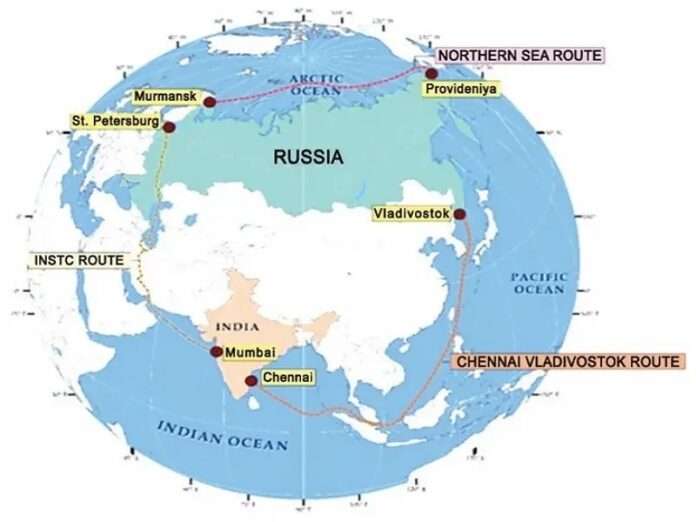Indian External Affairs Minister Dr. Subrahmanyam Jaishankar announced during this week’s Russian-Indian Trade Forum in Delhi that “The three connectivity initiatives between us, as mentioned by the First Deputy PM [of Russian Denis Manturov] as well – INSTC, Chennai-Vladivostok Corridor and the Northern Maritime Route – all need continued attention, if we are to realize full potential.” This amounts to advancing the Russo-Indo Ring proposal that was shared in January here.
The gist is that the North-South Transport Corridor (NSTC) through Iran, the Vladivostok-Chennai Maritime Corridor (VCMC, later rebranded as the Eastern Maritime Corridor or EMC), and the Northern Sea Route (NSR) can converge into a new multinational trade corridor around Eurasia. Its grand strategic importance is that it’s not centered on China like other trade corridors, which from Trump’s perspective can help “un-unite” Russia and China like he promised to do, ergo why he should appreciate this.
To be clear, the creation of a non-Chinese trade corridor around Eurasia along the lines of the Russo-Indo Ring (which could be rebranded as something more inclusive upon the involvement of more countries like those in ASEAN) isn’t aimed at reducing Russian-Chinese trade, which is mutually beneficial. All that it’ll do is preemptively avert Russia’s potentially disproportionate dependence on China by balancing the aforesaid out with other trade partners, principally India but ideally also ASEAN with time.
This outcome aligns with the spirit of Trump’s grand strategic goal to “un-unite” Russia and China, but the problem is that his reportedly planned resumption of “maximum pressure” on Iran through the imposition of more sanctions could imperil the NSTC’s viability if it deters India from using it. Therein lies the reason why that country should request an expansion of its existing sanctions waiver for using Chabahar port to include its trans-Iranian trade with Russia and not just Afghanistan.
The Biden Administration flirted with rescinding that same waiver, but as was recently argued, “Trump Can Repair The Damage That Biden Dealt To Indo-US Ties” if he takes a much more pragmatic stance. Instead of “maximally pressuring” India like his predecessor has informally done, albeit imperfectly given its “good cop, bad cop” approach, he can re-embrace India as one of the US’ top partners in Asia. To that end, he’d do well to expand the sanctions waiver to promote Russo-Indo trade via the NSTC.
It might be a bitter pill for him to swallow given that Iran would still skim some profits off of facilitating that part of the Russo-Indo Ring, which Trump should appreciate for helping to avert Russia’s potentially disproportionate dependence on China, but it’s a compromise worth considering. To help sweeten the deal, he might rely on his close friend Narendra Modi to convince the latter’s own close friend Putin to agree to some sort of compromise in Ukraine that would fall short of his maximum goals.
While that would also be a bitter pill for the Russian leader to swallow, which he might still end up doing though for the reasons explained here and here, it would be more palatable if he doesn’t have to worry about Trump cutting off Russo-Indo trade through the NSTC via more sanctions. So-called “economic diplomacy”, which in this context manifests itself by waiving US sanctions on Indian trade across the NSTC and not enforcing existing sanctions on trade with Russia, could be pivotal to any grand deal.
India is equally important to Russia’s and the US’ grand strategies, which places it in the unique role of possibly facilitating their talks, especially since Modi is close friends with both of their leaders. Orban is close with them too, but Hungary’s economic significance to Russia and the US pales in comparison to India’s, hence why Hungary can’t play anywhere near the role that India can. Accordingly, India can practice “economic diplomacy” with them to facilitate a deal, but only if they all have the political will.
India certainly does and Russia is clearly open to it so what’s needed is for Modi to convince Trump that it’s in the US’ grand strategic interests to accelerate his country’s rise as the supreme balancing force in the global systemic transition through these means. What’s being proposed in this analysis is admittedly ambitious, but given his prioritization of “economic diplomacy” as a lifelong businessman and famous dealmaker, Trump will predictably be receptive to whatever Modi might suggest in this regard.
It’s therefore incumbent that those two either discuss this in detail as soon as possible or India conveys these interconnected proposals to Trump’s team through other means in order for the returning American leader to consider incorporating these proposals into his plan to end the Ukrainian Conflict. The Russo-Indo Ring can geo-economically transform Eurasia so long as the US doesn’t oppose it, which it might not so long as Modi can convince Trump that this outcome aligns with his country’s interests.








